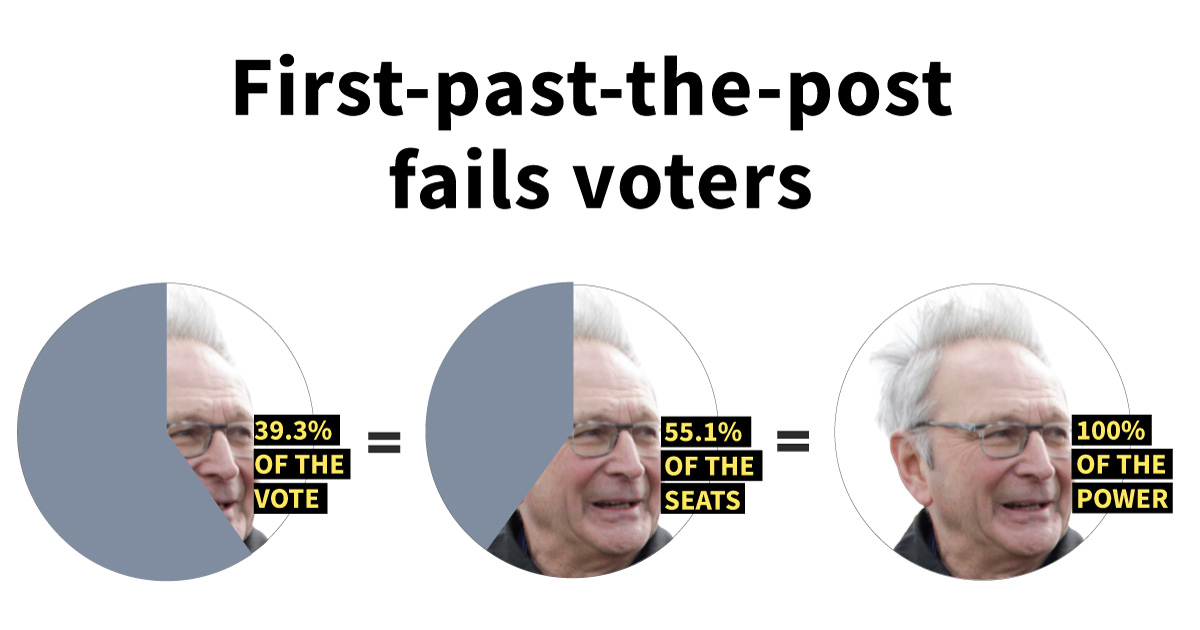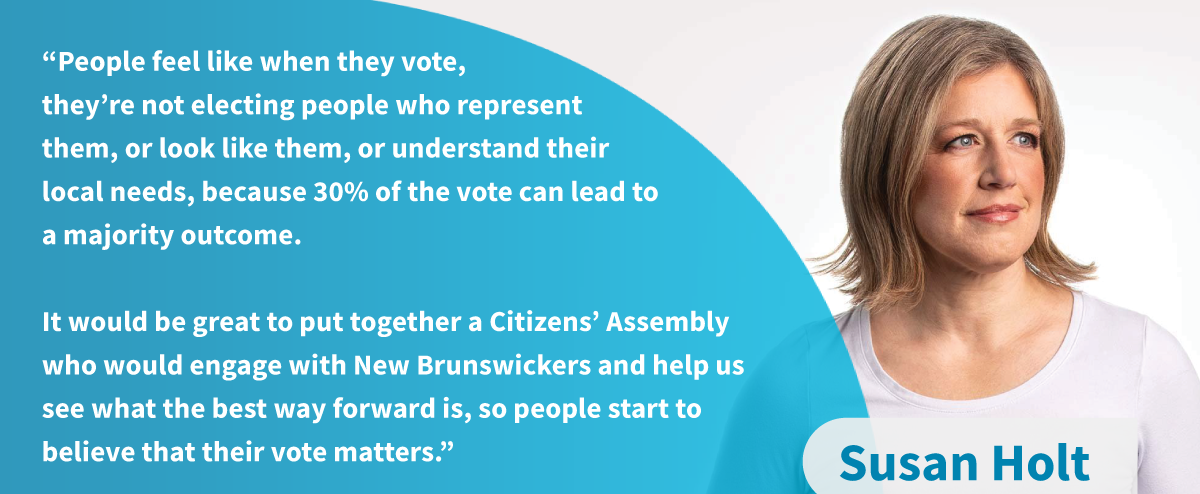
Cabinet Minister resignations in New Brunswick are shining a spotlight on the excessive concentration of power with the Premier under New Brunswick’s first-past-the-post, winner-take-all system.
Unilateral changes to Policy 713 on Sexual Orientation and Gender Identity―which has drawn condemnation by Pride Canada, backlash by the opposition Liberals and Green Party, and swift counter-measures from school districts―is just the latest example of decision-making from the top.
In 2020, Blaine Higgs’ PCs won a whopping 55% of the seats with just 39% of the popular vote.
A first-past-the-post manufactured “majority” often means the leader’s personal opinion dictates policy: Cabinet Ministers must fall in line or quit. Parties outside the government have little or no power to influence legislation, despite representing a majority of voters.
Federally, renowned Canadian political scientist Donald Savoie, who hails from New Brunswick, has warned about the concentration of power in the Prime Minister’s Office as it has ballooned over the decades.
The problem has only gotten worse as successive Prime Ministers further concentrated their power. In 2020, Savoie’s verdict on the system was even more severe:
“Cabinet has now joined Parliament as an institution relegated to making decisions legitimate that are struck elsewhere, or in the Prime Minister’s office and a handful of courtiers.”
New Brunswick Green Party Leader David Coon, who praised the more collaborative decision-making model of the previous minority government, minced no words about this “majority” government’s approach to decision-making on critical issues including health care and education:
“Premier Higgs is trying to run the province like it is a corporation, with him as its CEO. This is a democracy, so if he wants to be a CEO he should return to the private sector.”
What’s so rare in this latest example from New Brunswick is that it is Higgs’ own Ministers who are sounding the alarm and giving voters rare insight into how things actually work in the backrooms:
“Under the leadership of Premier Higgs, caucus has been less about consensus and more about him getting his own way.”
– Trevor Holder, MLA and former Minister of post-secondary education, training and labour.
“You (Blaine Higgs) avoid and circumvent process because you think it is a waste of time.”
– Dorothy Shephard, MLA and former Minister of Healthy and Inclusive Communities
Policy 713, which was widely supported by all parties in 2020, has become the latest casualty of this concentration of power. The changes appear to be aimed at whipping up support from a segment of the PC base that could help deliver the party another 39% majority.
Proportional representation is the fix for New Brunswick’s democracy
With proportional representation, parties would receive seats in proportion to their popular vote. Usually, this means that parties must compromise and build consensus in order to get legislation passed, ensuring in the process that policies have the support of a genuine majority of voters.
In a multi-party cabinet with proportional representation, decision-making would be a shared responsibility―not concentrated with one party leader.
In 2004, the New Brunswick Commission on Legislative Democracy, established by PC Premier Bernard Lord, recommended proportional representation for New Brunswick.
In April 2022, the New Brunswick Green Party put forward a motion asking the Legislative Assembly to urge the Government of New Brunswick to direct the boundaries commission to propose options for proportional representation as part of their review of boundaries before the next election in 2024.
It was soundly defeated by MLAs from the PCs and the Liberals.

Will Liberal Leader Susan Holt push for a New Brunswick Citizens’ Assembly on Electoral Reform?
In August 2022, Susan Holt was elected leader of the NB Liberal Party. During the leadership race, Holt openly supported a fairer electoral system and a New Brunswick Citizens’ Assembly on Electoral Reform.
Immediately after being elected leader, Holt told CBC radio:
“Electoral reform is a really interesting idea to me because we have been seeing a decline in voter turnout, people are sick and tired of politics as usual, and I’ve heard from so many people they feel their vote doesn’t matter…
“People feel like when they do vote, they’re not electing people who represent them, or look like them, or understand their local needs, because 30% of the vote can lead to a majority outcome.
“We’ve seen in other parts of the world where different electoral systems have produced strong, diverse and representative governments. I’d love to talk to Liberals, new Liberals, people who are interested in electoral reform about the different versions.
“It would be great to put together a Citizens’ Assembly who would engage with New Brunswickers and help us see what the best way forward is, so people start to believe that their vote matters.”
Fair Vote Canada’s New Brunswick chapter urges the New Brunswick Liberal Party―and all parties―to push for a New Brunswick Citizens’ Assembly on Electoral Reform, and to include such a commitment in their next election platforms.
